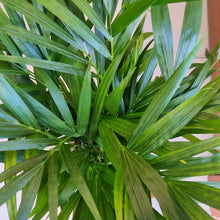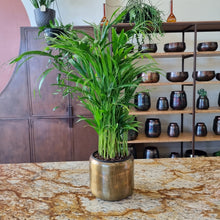The Areca Palm is a truly elegant indoor palm. Multiple stems emerge from its base, with numerous long, gracefully arching fronds growing close together along the stems. Leaves are pinnate, ie feather shaped. It is one of the top air purifying plants and a natural humidifier that will improve the air quality of your home or office as well as adding a relaxing tropical feel.
Areca Palm is sometimes known as Dypsis lutescens or Areca lutescens, more common names include Butterfly Palm, Yellow Palm and Golden Cane.
Care Instructions
Light:
Dypsis lutescens is tolerant of both light shade and bright, indirect light, however avoid excessive amounts of shade and direct light as these will harm the palm.
Watering:
Water well, keeping the soil moist at root level at all times. In summer, Areca Palms can be thirsty, particularly if located in a warm spot. Requires less water in winter. Do not overwater.
Temperature:
Average household temperatures between 15-25°C are fine, although the warmer the better. Will not tolerate temperatures below 10°C.
Humidity:
Areca palms enjoy high humidity levels. Place on a shallow gravel tray filled with water and mist regularly. Ideal in kitchens and bathrooms.
Feed:
Liquid fertiliser can be applied during the growing season, once a month or so should be sufficient.
Height & Growth Rate:
Areca Palms are moderate to fast growing plants and typically reach an ultimate height of around 3m, although this is unlikely indoors.
Toxicity:
Areca Palms are non-toxic and therefore safe around children and animals.
Air Purifying:
Palms clean and improve air quality by filtering formaldehyde, benzene and carbon monoxide toxins from the surrounding environment.
Origin:
Dypsis lutescens is native to Madagascar.






